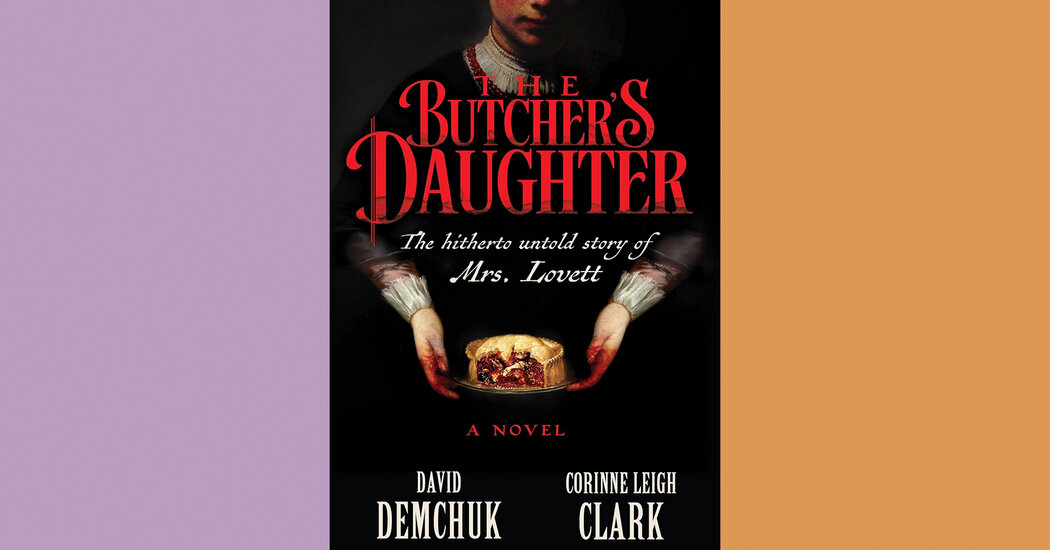THE BUTCHER’S DAUGHTER: The Hitherto Untold Story of Mrs. Lovett, by David Demchuk and Corinne Leigh Clark
For half a century — much longer, if you go back to the original 1840s penny dreadfuls — people have thrilled to the story of Sweeney Todd, the murderous London barber who cut short the lives of priests, fops, sailors and one especially loathsome judge before he met his own gruesome end. Sweeney’s tragic losses and appetite for vengeance have been well documented, most notably by the musical genius of Stephen Sondheim. But what of his partner in crime, Mrs. Lovett, who popped his poor victims into her pies? Does her tale not need attending, too?
David Demchuk and Corinne Leigh Clark’s epistolary novel “The Butcher’s Daughter: The Hitherto Untold Story of Mrs. Lovett” gives the woman beside the man her own turn in the spotlight. Part Victorian historical fiction, part grisly horror, the book follows a mysterious woman, Margaret C. Evans, a.k.a. Margery, as she recounts her life story to a never-seen (and, we learn at the opening of the book, missing) journalist, who is investigating the disappearance of Mrs. Lovett 50 years before. Though she does not disclose her true identity outright until fairly deep in the novel, it is clear within the first few pages that Margery is Mrs. Lovett, who — in a departure from the source material, where she is killed by Sweeney — is very much alive and confined to a nunnery.
Margery’s harrowing tale reframes Mrs. Lovett not as a villain but as a maligned girl fighting to survive. She’s a seductively evocative narrator, making it easy to forget that her every word should be taken with a hefty pinch of salt.
It will surprise nobody familiar with the musical that this is a gory book. The violence starts early, at Margery’s father’s butcher shop, where she is awakened each morning by the sounds and smells of sheep being slaughtered, and where it is a shame bordering on sin to let anything go to waste.
At 16, Margery catches the eye of a wealthy surgeon when a toddler is hit by a carriage in front of her shop and, in an attempt to save the child’s life, she amputates his leg. When Margery’s father dies soon thereafter, her mother sends her to work for the doctor. The horrors only increase from there: In the surgeon’s home, Margery faces medical experiments, botched abortions, Freemason conspiracies. By the time she lands in the pie shop on Fleet Street, she has been drugged and forcibly inseminated, fallen in love with a deaf prostitute, had her baby stolen and murdered the shop’s owner — oh, and discovered there’s a serial killer upstairs who keeps dropping corpses in her back room.
Demchuk and Clark have clearly done their research, crafting a ghoulish version of 1830s Britain that sets the stage for Margery’s misadventures. The book seems to be aiming for the sort of feminist reclaiming of familiar stories that have proliferated in recent years, from the lushly literary (“Circe”) to the fantastically irreverent (“My Lady Jane”). But in making Mrs. Lovett a vulnerable yet determined teenager, and in focusing on the brutal realities facing women — especially single, working-class ones — in the early 19th century, the authors lose some of the madcap genius that makes her so fun onstage. That Lovett is enterprising — an innovator, if a macabre one; this Lovett struggles to stay afloat. That Lovett is disturbingly zany; this one is, by unfortunate necessity, a realist.
This is a wild, high-octane, blood-soaked tale, but by the end, everything crimps together just a little too neatly (with one final, groan-worthy twist). Life, like baking or butchery, is a messy business. I wish the authors had left a bit more room for untidy possibilities.
THE BUTCHER’S DAUGHTER: The Hitherto Untold Story of Mrs. Lovett | By David Demchuk and Corinne Leigh Clark | Hell’s Hundred | 421 pp. | $27.95
